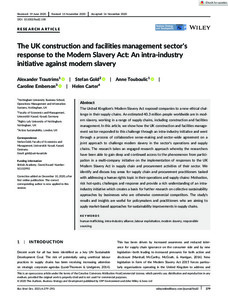| dc.date.accessioned | 2021-10-22T14:57:09Z | |
| dc.date.available | 2021-10-22T14:57:09Z | |
| dc.date.issued | 2020-12-02 | |
| dc.identifier | doi:10.17170/kobra-202110084854 | |
| dc.identifier.uri | http://hdl.handle.net/123456789/13321 | |
| dc.description.sponsorship | Gefördert im Rahmen des Projekts DEAL | ger |
| dc.language.iso | eng | eng |
| dc.rights | Namensnennung-Nicht-kommerziell 4.0 International | * |
| dc.rights.uri | http://creativecommons.org/licenses/by-nc/4.0/ | * |
| dc.subject | human trafficking | eng |
| dc.subject | intra-industry alliance | eng |
| dc.subject | labour exploitation | eng |
| dc.subject | modern slavery | eng |
| dc.subject | responsible sourcing | eng |
| dc.subject.ddc | 330 | |
| dc.title | The UK construction and facilities management sector's response to the Modern Slavery Act: An intra-industry initiative against modern slavery | eng |
| dc.type | Aufsatz | |
| dcterms.abstract | The United Kingdom's Modern Slavery Act exposed companies to a new ethical challenge in their supply chains. An estimated 40.3 million people worldwide are in modern slavery, working in a range of supply chains, including construction and facilities management. In this article, we show how the UK construction and facilities management sector responded to this challenge through an intra-industry initiative and went through a process of collaborative sense-making and sector-wide agreement on a joint approach to challenge modern slavery in the sector's operations and supply chains. The research takes an engaged research approach whereby the researchers have been able to gain deep and continued access to the phenomenon from participation in a multi-company initiative on the implementation of responses to the UK Modern Slavery Act in supply chain and procurement activities of their sector. We identify and discuss key areas for supply chain and procurement practitioners tasked with addressing a human rights topic in their operations and supply chains: Motivation, risk hot-spots, challenges and response and provide a rich understanding of an intra-industry initiative which creates a basis for further research on collective sustainability approaches by businesses who are otherwise commercial competitors. The study's results and insights are useful for policymakers and practitioners who are aiming to apply market-based approaches for sustainability improvements in supply chains. | eng |
| dcterms.accessRights | open access | |
| dcterms.creator | Trautrims, Alexander | |
| dcterms.creator | Gold, Stefan | |
| dcterms.creator | Touboulic, Anne | |
| dcterms.creator | Emberson, Caroline | |
| dcterms.creator | Carter, Helen | |
| dc.relation.doi | doi:10.1002/bsd2.158 | |
| dc.relation.projectid | British Academy. Grant Number: SG152992 | |
| dc.subject.swd | Menschenhandel | ger |
| dc.subject.swd | Intraindustrieller Außenhandel | ger |
| dc.subject.swd | Ausbeutung | ger |
| dc.subject.swd | Arbeitsbedingungen | ger |
| dc.subject.swd | Sklaverei | ger |
| dc.type.version | publishedVersion | |
| dcterms.source.identifier | eissn:2572-3170 | |
| dcterms.source.issue | Issue 3 | |
| dcterms.source.journal | Business Strategy and Development | eng |
| dcterms.source.pageinfo | 279-293 | |
| dcterms.source.volume | Volume 4 | |
| kup.iskup | false | |


